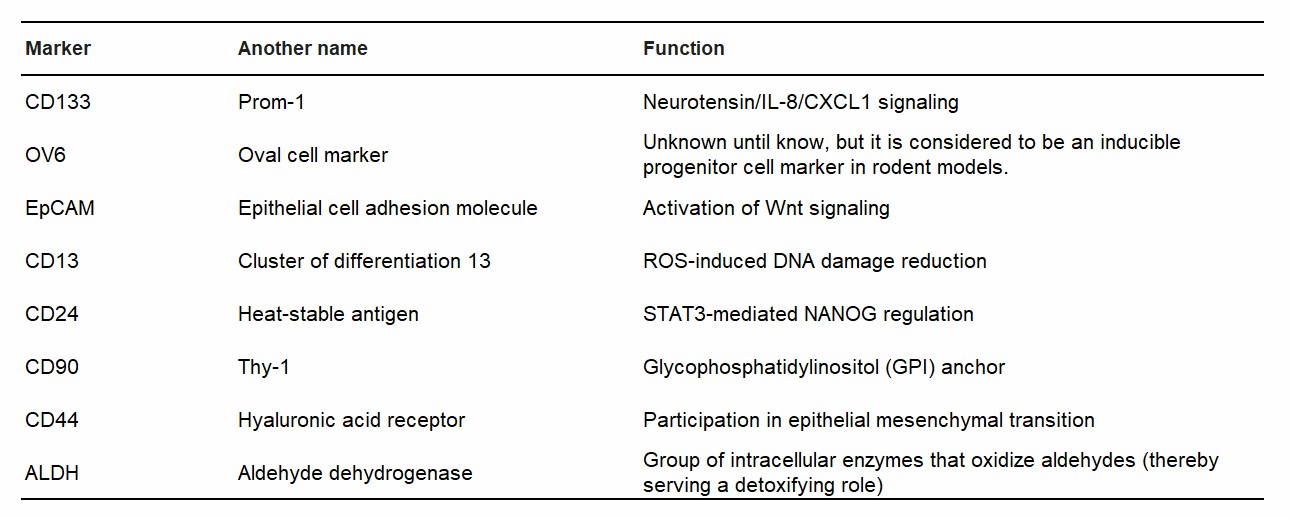Liver Cancer Stem Cell Markers
Related Symbol Search List
Immunology Background
Overview of Liver Cancer Stem Cell Markers
Liver cancer is a malignant tumor that poses a serious threat to human health, and liver cancer stem cells are considered to be one of the key factors contributing to the development and recurrence of hepatocellular carcinoma. liver cancer stem cells have the ability to self-renew, proliferate, and differentiate into a wide range of cell types, and they are highly resistant to therapeutic treatments. Therefore, the study of liver cancer stem cell markers has become an important direction in the fight against this disease. In recent years, a series of advances have been made in the study of liver cancer stem cell markers. By analyzing the expression profiles in tumor tissues and cell lines, researchers have discovered some markers related to liver cancer stem cells, such as CD133, CD44, EpCAM, and OV6 (As shown in Figure 1). The existence of these markers can help to identify and isolate the liver cancer stem cell, and then study its properties and functions in depth. In addition, the researchers also verified the specificity of these markers for liver cancer stem cells and explored their roles in liver cancer development through in vitro culture and transplantation models of stem cells.
 Fig.1 Liver cancer stem cell markers in hepatocellular carcinoma. (Flores-Téllez TN, et al., 2017)
Fig.1 Liver cancer stem cell markers in hepatocellular carcinoma. (Flores-Téllez TN, et al., 2017)
Research Areas of Liver Cancer Stem Cell Markers
The field of research on liver cancer stem cell markers is multifaceted.
- Functional and characterization of liver cancer stem cell markers
To further explore the functions and properties of liver cancer stem cell markers, such as their roles in hepatocellular carcinoma development and metastasis, and the molecular mechanisms associated with tumor stem cell properties. Such studies can help us better understand the biological behavior of liver cancer stem cells and their role in liver cancer.
- Diagnostic and prognostic evaluation of liver cancer
Expanding the study of liver cancer stem cell markers could contribute to the development of more accurate diagnostic methods and prognostic assessment indicators for liver cancer. Detecting the expression or specific mutations of liver cancer stem cell markers can provide more reliable early diagnosis, monitor disease progression, and assess treatment efficacy.
- Liver cancer treatment research
Studying liver cancer stem cell markers can provide new clues about liver cancer treatment strategies. This includes the development of new drugs, vaccines, or immunotherapies that target liver cancer stem cells, as well as the improvement of existing radiotherapy treatments to target liver cancer stem cells.
- Origin and development of liver cancer stem cells
Unraveling the origin and developmental pathways of liver cancer stem cells is critical to further understanding the mechanisms of liver cancer development. Studies in this area can examine the relationship between liver cancer stem cells and normal liver stem cells, as well as the differentiation relationship with other types of liver cancer cells.
- Research on the interaction between liver cancer stem cells and the immune system
Exploring the interactions between liver cancer stem cells and the immune system can help us understand the mechanisms of immune escape in liver cancer and provide new targets for developing immunotherapeutic strategies. This includes studying the interaction of surface markers of liver cancer stem cells with immune cells and the potential application of stem cells in liver cancer immunotherapy.
Reference:
- Flores-Téllez TN, Villa-Treviño S, Piña-Vázquez C. Road to stemness in hepatocellular carcinoma. World J Gastroenterol. 2017 Oct 7;23(37):6750-6776. doi: 10.3748/wjg.v23.i37.6750. PMID: 29085221; PMCID: PMC5645611.

